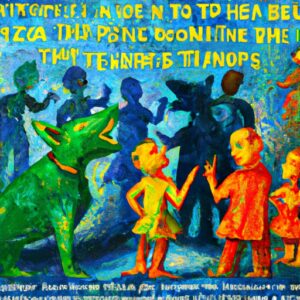Unlock the charm of Italy with our handpicked collection of the Best Italian One-Liners. Discover wit, wisdom, and a dash of la dolce vita!
The charm of Italian humor is renowned for its captivating charm, characterized by a unique blend of wit, wordplay, and cultural insights. Italians have an expressive nature that extends to their humor, making it an essential part of their social interactions and daily life.
Whether it’s a clever pun or a witty observation, Italian one-liners have the power to evoke laughter and create connections among people.
The Art of One-Liners and Their Impact
One-liners are concise and clever expressions that pack a punch with just a few words. The art of crafting an effective one-liner lies in the ability to convey humor, irony, or a thought-provoking idea briefly and memorably.
Italian one-liners have been perfected over generations, passed down through oral tradition, and embraced as an essential part of Italian comedy.
Funny Italian One-Liners
Chi dorme non piglia pesci.
Whoever sleeps doesn’t catch fish.
This one-liner conveys a timeless message about the importance of taking action and seizing opportunities. It humorously emphasizes that inactivity or laziness leads to missed chances in life.
Non tutte le ciambelle riescono col buco.
Not all donuts come out with a hole.
It conveys the idea that despite our efforts, some things may not turn out the way we expect, and that’s okay.
A caval donato non si guarda in bocca.
Don’t look a gift horse in the mouth.
This one-liner advises against being critical or unappreciative of a gift or favor received. It humorously reminds us to value what we are given graciously.
Meglio un uovo oggi che una gallina domani.
Better an egg today than a hen tomorrow.
This one-liner encourages appreciating what we have in the present rather than waiting for something better in the future. It humorously emphasizes the importance of seizing the moment.
Using Italian Jokes as a Learning Tool
When it comes to understanding Italian humor, using jokes as a learning tool can be incredibly effective. Humor has a unique way of engaging our attention and making information stick.
In this section, we will explore how incorporating Italian jokes into language learning can enhance vocabulary, grammar, and pronunciation skills.
Additionally, we will discuss the power of embracing Italian humor as a means to overcome apprehensions and build confidence in mastering the language.
Let’s dive into the world of Italian jokes and discover a fun and immersive way to learn the language.
How to Use Italian One-Liners in Everyday Life?
- Breaking the ice and fostering connections Using Italian one-liners in conversations can serve as an icebreaker, easing social interactions and fostering connections with native speakers.
- Humor as a tool for communication and social bonding Embracing Italian one-liners as part of communication allows learners to engage in light-hearted banter, making conversations enjoyable and memorable.
- Sharing laughs and building rapport. Sharing a good laugh with native speakers through one-liners builds rapport and creates a positive and enjoyable language-learning experience.
-
Some Facts About How to Understand Italian Humor:
- ✅ Italians are known for their expressive and animated body language and hand gestures. (Source: Team Research)
- ✅ Irony is a cornerstone of Italian humor, creating surprising contradictions and cleverly hidden intent. (Source: Team Research)
- ✅ Italians have a positive outlook on life and find the funny side of any situation. (Source: Team Research)
- ✅ Italians delight in laughing at themselves, often using self-deprecating humor. (Source: Team Research)
- ✅ Learning Italian through humor, such as Italian jokes, can be an effective language-learning method. (Source: Team Research)
How to Be Funny in Italian?
Being funny in a foreign language may seem like a daunting task, but with the right approach and a sprinkle of confidence, you can master the art of humor in Italian.
Here are some tips to help you tickle the funny bone and engage in light-hearted banter with native Italian speakers:
Learn Humorous Phrases: Start by familiarizing yourself with common funny phrases and expressions used in the Italian language. Learn how to deliver puns and witty one-liners to add humor to your conversations.
Books, online resources, and language courses often feature curated lists of Italian jokes and humorous expressions.
Embrace Wordplay: Italian is rich in wordplay, and mastering puns and double entendres can make you stand out as a humorous speaker. Play with similar-sounding words or use different meanings of a word to create clever and entertaining jokes.
Use Gestures and Facial Expressions: Italians are known for their expressive gestures and animated facial expressions. Incorporate these nonverbal cues into your humor to enhance the comedic effect and make your jokes more engaging.
Practice Timing and Delivery: The timing and delivery of a joke are crucial to its success. Pay attention to the natural flow of conversation, and find the right moment to deliver your humorous lines. A well-timed joke can make all the difference in eliciting laughter.
Observe and Adapt: Pay attention to how native Italian speakers use humor in their daily interactions. Observe the types of jokes they make, the subjects they find funny, and the appropriate contexts for humor. Adapt your humor to suit the cultural nuances and sensitivities of your audience.
Use Self-Deprecating Humor: Italians often enjoy self-deprecating humor, where speakers poke fun at themselves in a lighthearted manner. Embrace this style of humor to connect with others and create a sense of camaraderie.
Incorporate Italian Culture: Humor often reflects cultural references and societal norms. Familiarize yourself with Italian culture, traditions, and landmarks to make jokes that resonate with your audience and demonstrate your appreciation for their heritage.
Laugh with Others: Don’t be afraid to laugh at others’ jokes and show appreciation for their humor. Laughter is a universal language, and expressing joy when others make you laugh will encourage them to share more humorous moments with you.
Be Confident and Relax: Humor thrives in a relaxed and positive atmosphere. Be confident in your language skills, and don’t worry about making mistakes. Embrace the playful side of language learning and enjoy the process of making others smile.
Practice, Practice, Practice: Like any skill, being funny in Italian requires practice. Engage in conversations with native speakers, join language exchange groups, and watch Italian comedies or stand-up shows to immerse yourself in the language’s humor.
Remember, humor is a wonderful tool for building connections and making language learning enjoyable. Embrace the playfulness of Italian culture, and soon you’ll be sharing laughs and creating memorable moments with your newfound comedic flair in Italian.
Interested in learning Italian with Italian jokes for free.










2 Responses
Hey Natalia! I completely agree, the post title is super intriguing. I’m also excited to see some hilarious Italian one-liners. Fingers crossed that we get some good ones shared soon. Thanks for starting this fun conversation! 😄🇮🇹
Great post title! I can’t wait to hear some hilarious Italian one-liners. Share them with us!